牛津译林版九上 Unit 3 Teenage problems Study skills 课件(共33张PPT)
文档属性
| 名称 | 牛津译林版九上 Unit 3 Teenage problems Study skills 课件(共33张PPT) | 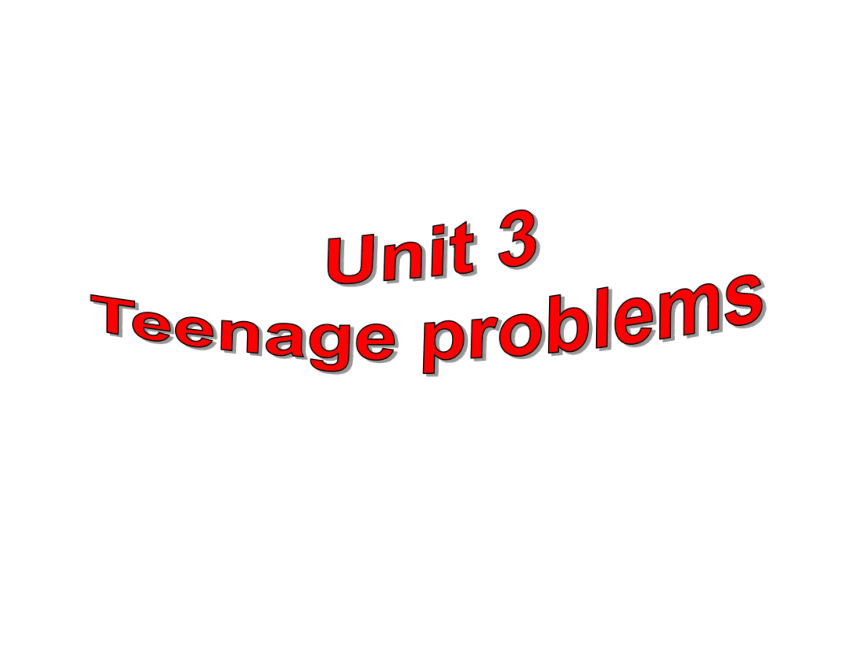 | |
| 格式 | ppt | ||
| 文件大小 | 1.6MB | ||
| 资源类型 | 教案 | ||
| 版本资源 | 牛津译林版 | ||
| 科目 | 英语 | ||
| 更新时间 | 2020-10-23 11:47:44 | ||
图片预览

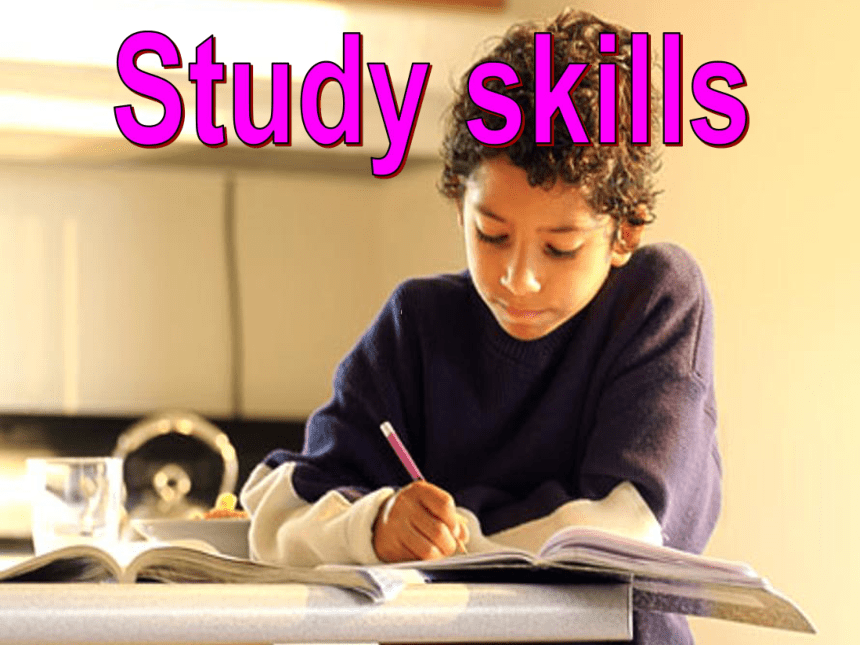
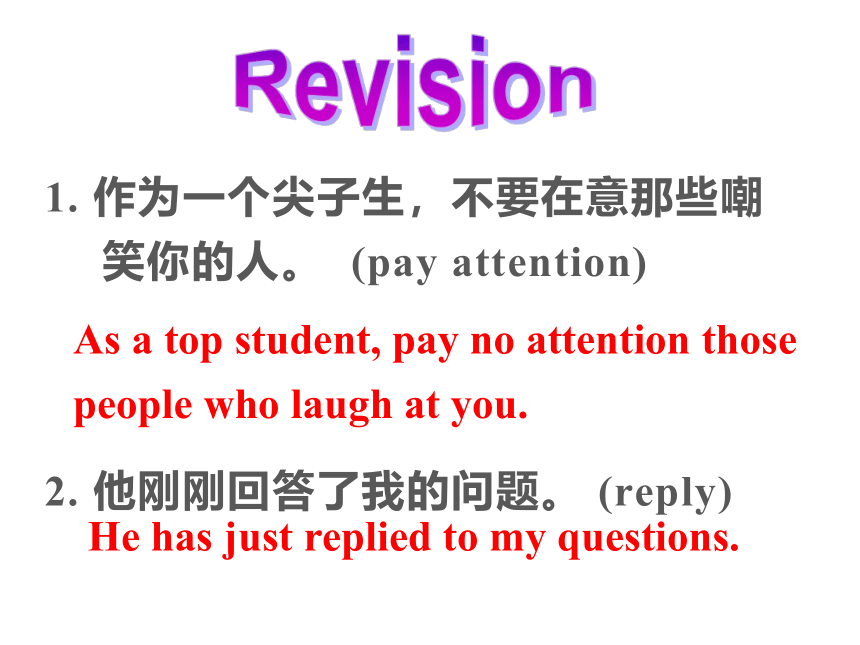
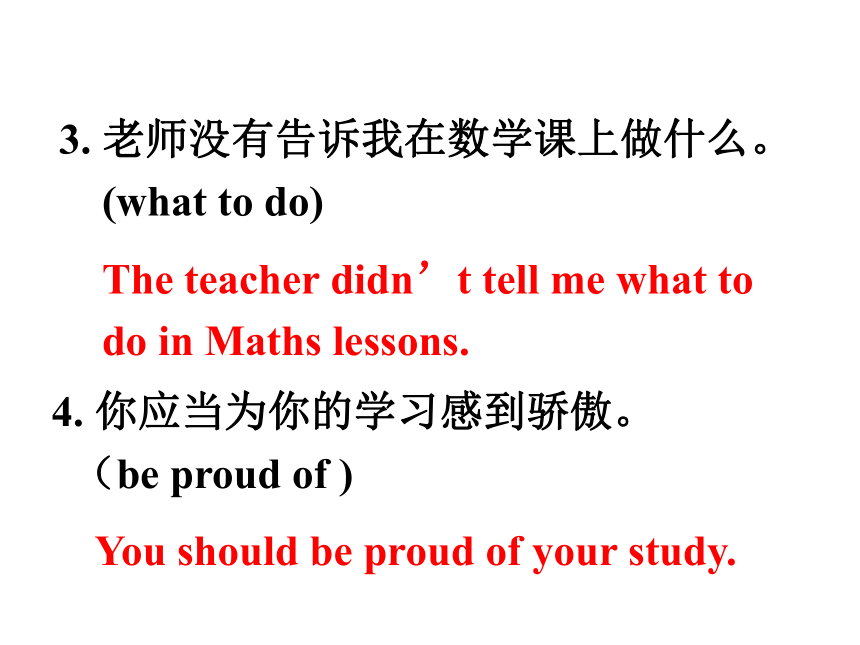
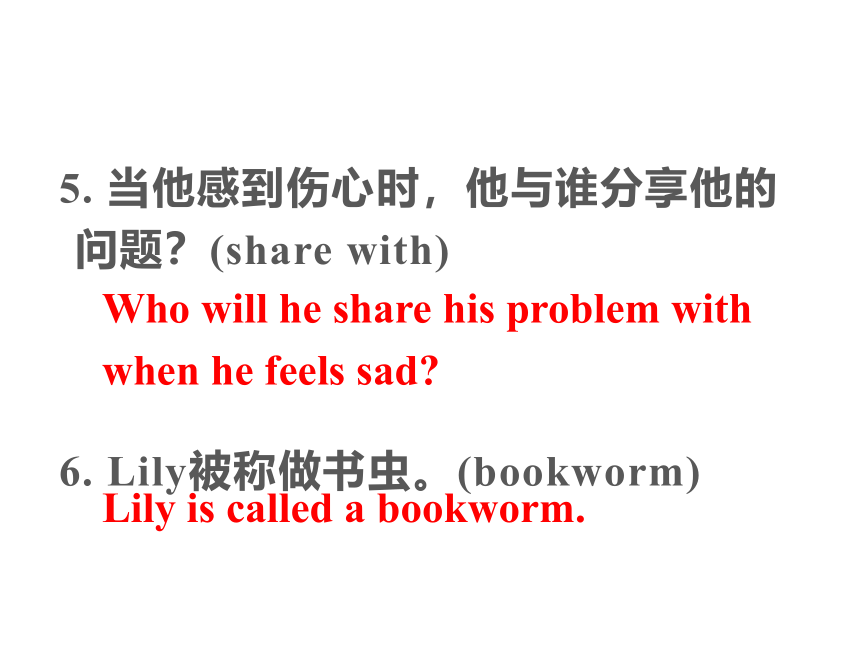
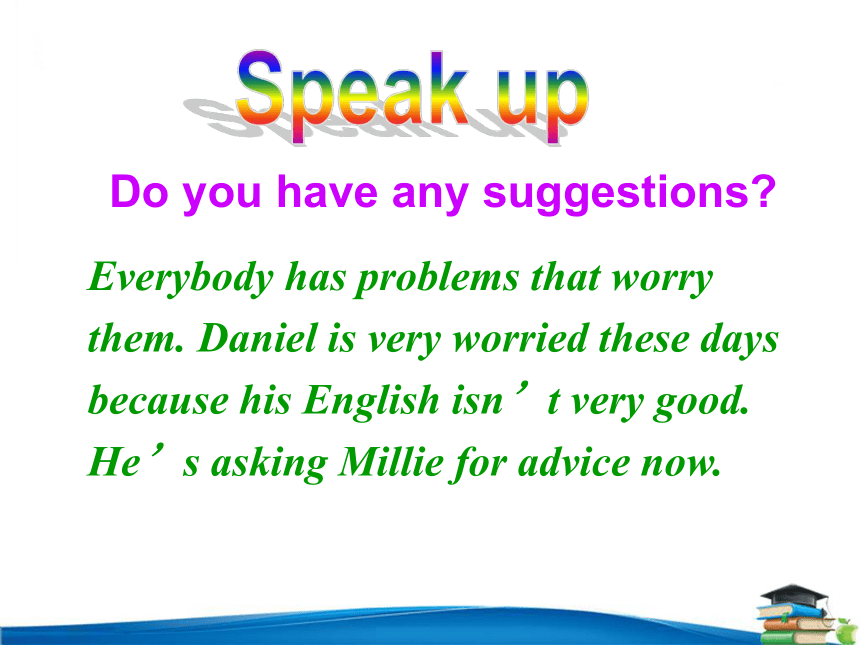
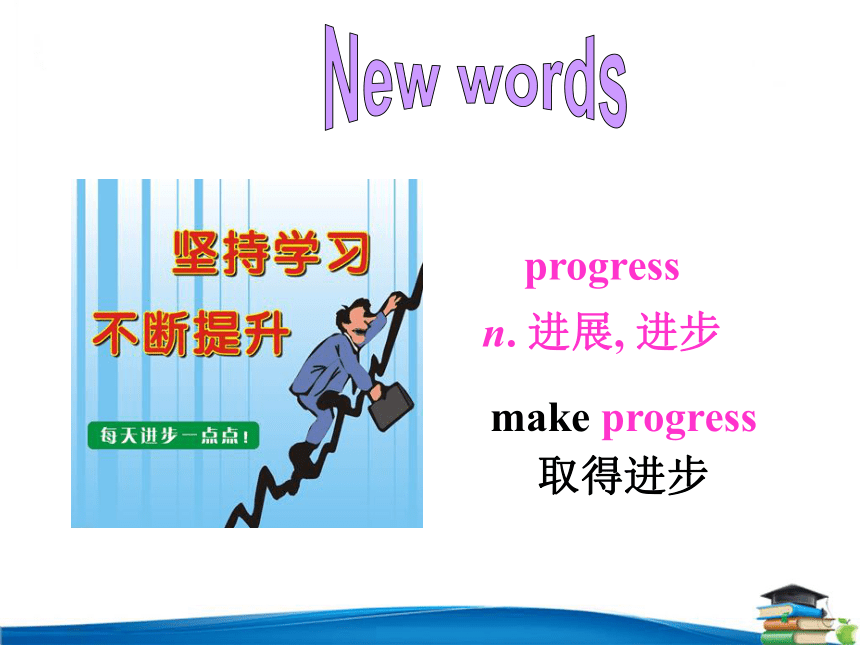

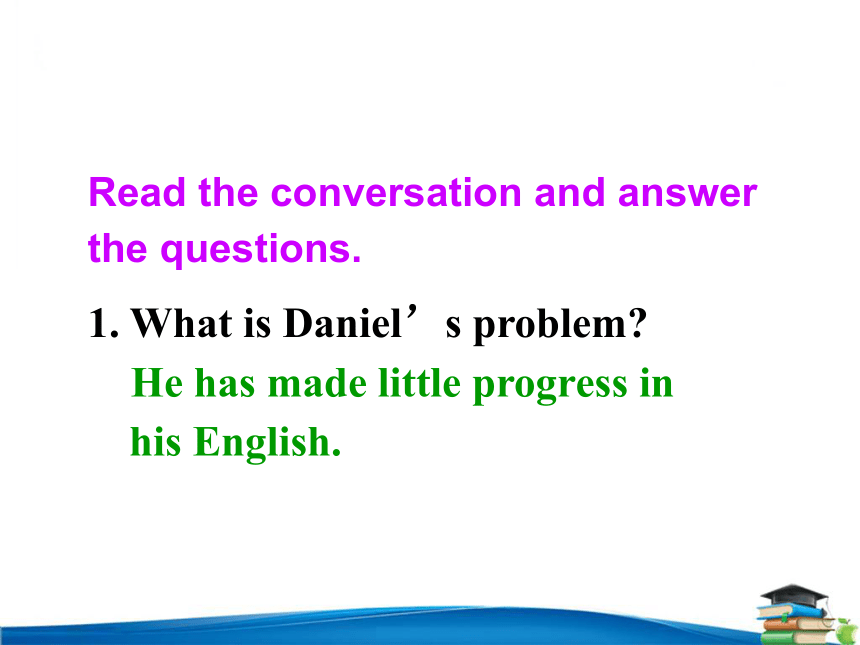
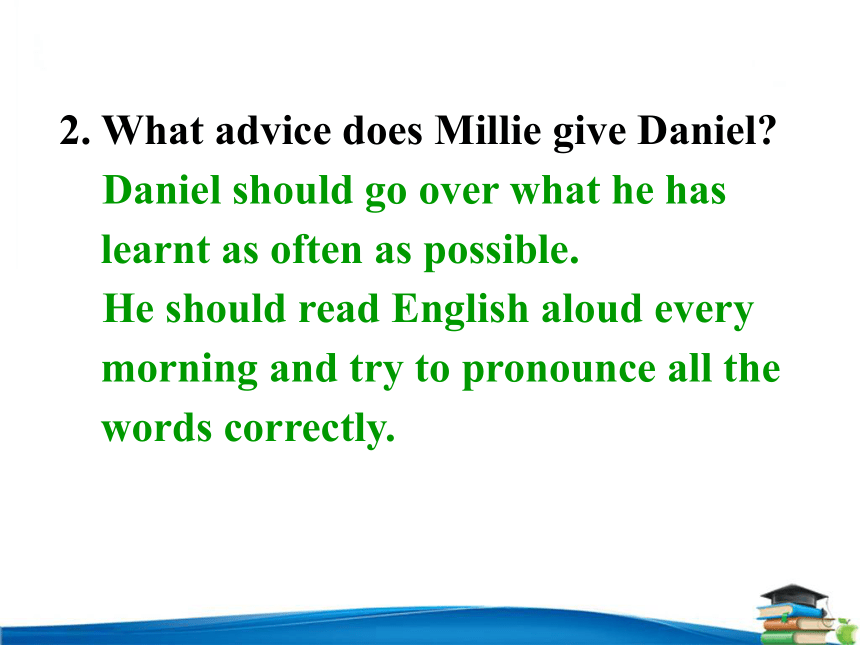
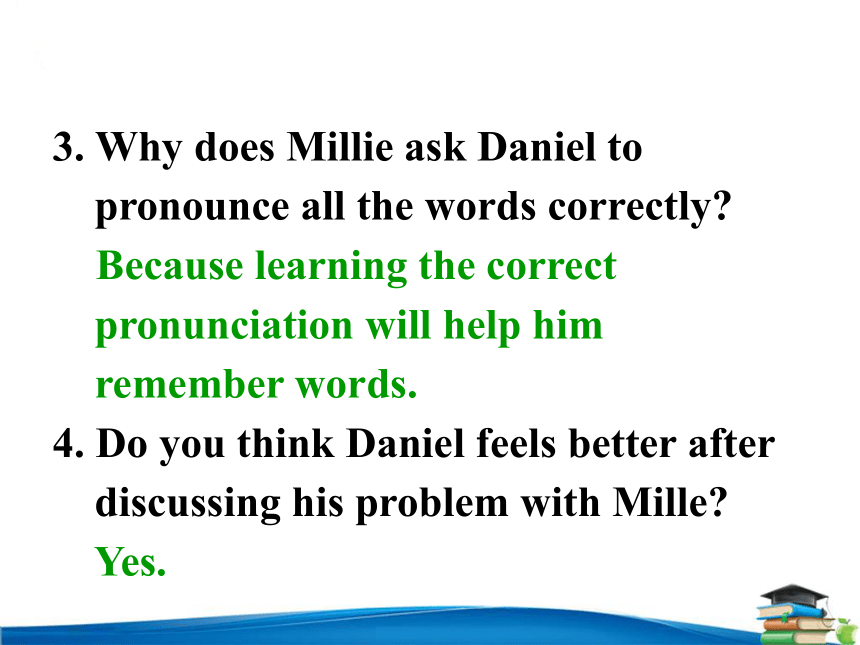
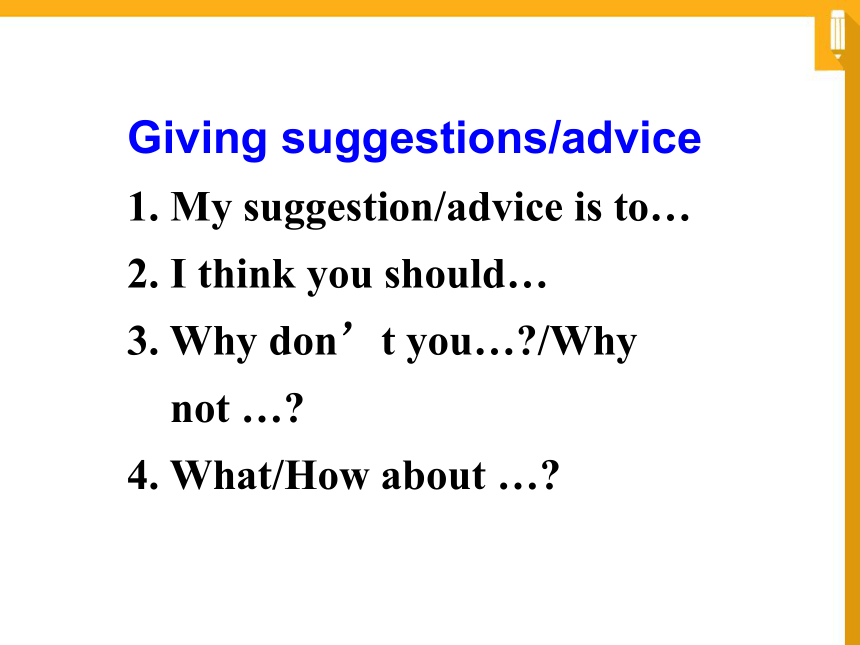
文档简介
1. 作为一个尖子生,不要在意那些嘲笑你的人。 (pay attention)
2. 他刚刚回答了我的问题。 (reply)
As a top student, pay no attention those people who laugh at you.
He has just replied to my questions.
3. 老师没有告诉我在数学课上做什么。
(what to do)
The teacher didn’t tell me what to do in Maths lessons.
4. 你应当为你的学习感到骄傲。
(be proud of )
You should be proud of your study.
5. 当他感到伤心时,他与谁分享他的问题?(share with)
6. Lily被称做书虫。(bookworm)
Who will he share his problem with when he feels sad?
Lily is called a bookworm.
Do you have any suggestions?
Everybody has problems that worry them. Daniel is very worried these days because his English isn’t very good. He’s asking Millie for advice now.
progress
n. 进展, 进步
make progress
取得进步
pronounce vt. 发音
pronunciation n. 发音
e.g. How do you pronounce this word?
Can?you?give me some advice on
my pronunciation??
Read the conversation and answer the questions.
1. What is Daniel’s problem?
He has made little progress in his English.
2. What advice does Millie give Daniel?
Daniel should go over what he has learnt as often as possible.
He should read English aloud every morning and try to pronounce all the words correctly.
3. Why does Millie ask Daniel to pronounce all the words correctly?
Because learning the correct pronunciation will help him remember words.
4. Do you think Daniel feels better after discussing his problem with Mille?
Yes.
Giving suggestions/advice
1. My suggestion/advice is to…
2. I think you should…
3. Why don’t you…?/Why not …?
4. What/How about …?
1. I’m very worried. 我非常担心。
worried adj. 担心的, 烦恼的
可用于系表结构, 主语一般是人。
be worried about sth. /sb
worrying adj. 令人担忧的, 令人担心的
主语一般为事物。
worry v. 担心
worry (about) sth./ sb.
2. Perhaps you should go over what you’ve learnt as often as possible.
也许你应该尽可能多地复习你已经学习过的知识。
go over 复习; 回顾
e.g. Go?over?the text before the exam.
考试前复习课文。
根据句意及汉语提示, 写出所缺单词。
1. The teacher is teaching us how to __________(发音) these new words.
2. Bob read the letter ______(大声地) to his grandfather.
pronounce
aloud
3. Mrs Lee is very happy that Daniel has made great _________(进步) in his English.
4. Have you looked up the magazine he __________(说起) yesterday?
5. Parents will be ________(担心的) if their children come home late.
worried
progress
mentioned
Unit 3 Teenage problems
To predict is to guess what comes next. It helps us understand what kinds of books or articles we are reading, and where we might find information.
When we read an article, we can
often predict the content from the
title. We can also use the headings
in an article to predict the main idea
of each part. Headings are the titles
of the different parts. Often, they are
in bold.
There is an article called “The
trouble with teenagers”. Predict the
points that will be talked about in
the article and tick (√ ) the correct
boxes.
□1 making friends
□2 life in Australia
□3 feeling lonely
□4 schoolwork and hobbies
□5 how our body changes
□6 worrying about tests
□7 study, study, study
□8 love or friendship
√
√
√
√
√
√
√
Look at these names of the books. Which ones do you think may help you find the useful information about health?
The Diary of Clever Kid Fashion
Teenage Fitness
The Ways to Learn English
Traveller The Family Doctor
If a question begins with when,
then the answer will be a time or date.
If a question begins with why,
then the answer will give a reason,
often beginning with because.
To get a general idea of a book or an article, we should ask some basic questions. If we predict the answers that the questions might have, it will help us find the answers more quickly and easily when we read in detail.
Millie is reading an article in
Teenagers magazine. March her
questions with your predicted
answers. Write the correct letter in
each blank.
1. What is it
about? ___
2. When did it
happen?___
3. Who is it
about? ___
d. Problems with the
new school.
e. A few weeks after
the new term.
f. A girl called Zoe.
d
e
f
4. Where did it
happen? ___
5. Why did it
happen? ___
6. How did it
happen? ___
a. In a new school
b. Because she moved
to another city.
c. She is shy and quiet,
and she has no new
friends at school.
a
b
c
Fill in the blanks with what, when,
where, why, who to complete the
sentences.
The children don’t know ______ is in
their stockings.
I wonder ______ she will pay me back.
what
when
The father asked ______ his son
was going.
He forgot _______ gave this gift
to him.
The teacher wants to know
_______ Mary was late for school.
who
why
where
选择题。
The girl asked if they _____ some food
and drink with them
A. took B. take C. takes D. will take
(2) She asked Linda if ______ go and get some food.
A. could she B. she could
C. she can D. she may
(3) I don’t know ____ he still lives here
after so many years.
A. whether B. where
C. what D. when
(4) Do you know ______ they listened to
yesterday evening?
A. what B. when C. why D. how
(5) He asked me ______ told me the accident.
A. when B. which
C. who D. whose
(6) Please tell me _______ last year.
A. where does your sister work
B. where did your sister work
C. where your sister works
D. where your sister worked
Preview the next lesson.
2. 他刚刚回答了我的问题。 (reply)
As a top student, pay no attention those people who laugh at you.
He has just replied to my questions.
3. 老师没有告诉我在数学课上做什么。
(what to do)
The teacher didn’t tell me what to do in Maths lessons.
4. 你应当为你的学习感到骄傲。
(be proud of )
You should be proud of your study.
5. 当他感到伤心时,他与谁分享他的问题?(share with)
6. Lily被称做书虫。(bookworm)
Who will he share his problem with when he feels sad?
Lily is called a bookworm.
Do you have any suggestions?
Everybody has problems that worry them. Daniel is very worried these days because his English isn’t very good. He’s asking Millie for advice now.
progress
n. 进展, 进步
make progress
取得进步
pronounce vt. 发音
pronunciation n. 发音
e.g. How do you pronounce this word?
Can?you?give me some advice on
my pronunciation??
Read the conversation and answer the questions.
1. What is Daniel’s problem?
He has made little progress in his English.
2. What advice does Millie give Daniel?
Daniel should go over what he has learnt as often as possible.
He should read English aloud every morning and try to pronounce all the words correctly.
3. Why does Millie ask Daniel to pronounce all the words correctly?
Because learning the correct pronunciation will help him remember words.
4. Do you think Daniel feels better after discussing his problem with Mille?
Yes.
Giving suggestions/advice
1. My suggestion/advice is to…
2. I think you should…
3. Why don’t you…?/Why not …?
4. What/How about …?
1. I’m very worried. 我非常担心。
worried adj. 担心的, 烦恼的
可用于系表结构, 主语一般是人。
be worried about sth. /sb
worrying adj. 令人担忧的, 令人担心的
主语一般为事物。
worry v. 担心
worry (about) sth./ sb.
2. Perhaps you should go over what you’ve learnt as often as possible.
也许你应该尽可能多地复习你已经学习过的知识。
go over 复习; 回顾
e.g. Go?over?the text before the exam.
考试前复习课文。
根据句意及汉语提示, 写出所缺单词。
1. The teacher is teaching us how to __________(发音) these new words.
2. Bob read the letter ______(大声地) to his grandfather.
pronounce
aloud
3. Mrs Lee is very happy that Daniel has made great _________(进步) in his English.
4. Have you looked up the magazine he __________(说起) yesterday?
5. Parents will be ________(担心的) if their children come home late.
worried
progress
mentioned
Unit 3 Teenage problems
To predict is to guess what comes next. It helps us understand what kinds of books or articles we are reading, and where we might find information.
When we read an article, we can
often predict the content from the
title. We can also use the headings
in an article to predict the main idea
of each part. Headings are the titles
of the different parts. Often, they are
in bold.
There is an article called “The
trouble with teenagers”. Predict the
points that will be talked about in
the article and tick (√ ) the correct
boxes.
□1 making friends
□2 life in Australia
□3 feeling lonely
□4 schoolwork and hobbies
□5 how our body changes
□6 worrying about tests
□7 study, study, study
□8 love or friendship
√
√
√
√
√
√
√
Look at these names of the books. Which ones do you think may help you find the useful information about health?
The Diary of Clever Kid Fashion
Teenage Fitness
The Ways to Learn English
Traveller The Family Doctor
If a question begins with when,
then the answer will be a time or date.
If a question begins with why,
then the answer will give a reason,
often beginning with because.
To get a general idea of a book or an article, we should ask some basic questions. If we predict the answers that the questions might have, it will help us find the answers more quickly and easily when we read in detail.
Millie is reading an article in
Teenagers magazine. March her
questions with your predicted
answers. Write the correct letter in
each blank.
1. What is it
about? ___
2. When did it
happen?___
3. Who is it
about? ___
d. Problems with the
new school.
e. A few weeks after
the new term.
f. A girl called Zoe.
d
e
f
4. Where did it
happen? ___
5. Why did it
happen? ___
6. How did it
happen? ___
a. In a new school
b. Because she moved
to another city.
c. She is shy and quiet,
and she has no new
friends at school.
a
b
c
Fill in the blanks with what, when,
where, why, who to complete the
sentences.
The children don’t know ______ is in
their stockings.
I wonder ______ she will pay me back.
what
when
The father asked ______ his son
was going.
He forgot _______ gave this gift
to him.
The teacher wants to know
_______ Mary was late for school.
who
why
where
选择题。
The girl asked if they _____ some food
and drink with them
A. took B. take C. takes D. will take
(2) She asked Linda if ______ go and get some food.
A. could she B. she could
C. she can D. she may
(3) I don’t know ____ he still lives here
after so many years.
A. whether B. where
C. what D. when
(4) Do you know ______ they listened to
yesterday evening?
A. what B. when C. why D. how
(5) He asked me ______ told me the accident.
A. when B. which
C. who D. whose
(6) Please tell me _______ last year.
A. where does your sister work
B. where did your sister work
C. where your sister works
D. where your sister worked
Preview the next lesson.
